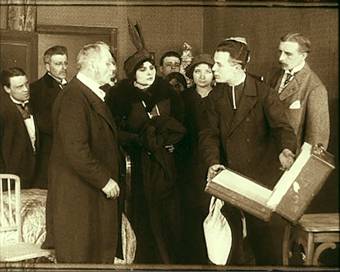|
The
Fantômas stories first appeared as
a series of novels, produced at the dizzying rate of one
a month by Marcel Allain and Pierre Souvestre, whose working
method was to draw up the general plot between them and
then go off and write alternate chapters independently of
each other, meeting later to tie the two halves of the story
together in the final chapter. In a move that prefigured
modern Hollywood by almost a century, the books were snapped
up for the film rights almost as soon as they appeared.
32 novels were published in total between February 1911
and September 1913 and were a huge popular success. The
first Fantômas film, produced by
the Gaumont studio and directed by Louis Feuillade, was
released in 1913. In all, five films were produced by Gaumont and, also anticipating modern trends, American studios
soon became interested. Fox made their own version in the
1920s, only for France to recapture the series in the 1931
with the first Fantômas sound film,
produced by Braunberger-Richebé Studios and directed
by Paul Fejos. Further films appeared in the 30s, 40s and
60s, and a TV series in 1979. As you may gather, the stories
appear to have both popular appeal and longevity.

Fantômas
himself may sound like a superhero from the shadows, but
he was actually a master criminal
and a pretty damned ruthless one at that. As if that wasn't
enough, at the end of every story he evaded capture and
went on to fight, rob and even kill another day, making Fantômas one of the silver screen's
first anti-heroes. Known for his black costume and mask
and his various convincing disguises, his true identity
remains unknown to the authorities and the public at large,
and he repeatedly outsmarts the Parisian police, especially
his determined but luckless nemesis, Inspector Juve.
All
five films are included in this Artificial Eye 2-disc set,
which has been licensed from Gaumont in France, the studio
that both produced the series and oversaw the restoration
work done for this DVD version. Now before I go any further
I should mention that the review copy supplied to us was
a missing a disc, and I am thus only to cover disc 2 at present. I debated for a couple of weeks about whether
to go ahead with what effectively amounts to half a review,
but decided to cover it anyway on the basis that even this
one disc provides a solid sampling of the films themselves
and the quality of the transfers, and also contains the
key extra feature. Of course, coming to the series on films 4 and 5 is hardly ideal, but at the same time is a
somewhat intriguing experience, as arriving in the middle
of a story and having to put together the pieces as the
plot unfolds provides its own pleasures.
The
first three films – Fantômas: In the Shadow
of the Guillotine, Juve versus Fantômas
and the brilliantly titled The Murderous Corpse – are on disc 1. First up on disc 2 is Fantômas
versus Fantômas, in which Inspector Juve,
having repeatedly failed to catch or even identify Fantômas,
is himself suspected of being the master criminal and locked
up accordingly, leaving the real Fantômas free to
carry on his work relatively unhindered. Regarded by many
fans as one of the best of the series, cinematically it's
less than thrilling stuff, with whole scenes covered in
single, long-held wide shots that contain a great deal of dialogue,
little of which is identified by inter-titles. But
stick with it and the rewards are there: Fantômas
disguising himself as a detective from the US (complete
with calling cards announcing himself as "Tom Bob – American Detective"); a moment of surrealistic horror
(the Surrealists were huge fans of the original stories)
announced as "The Wall That Bleeds," in which
a workman hammers a nail through a wall and into the body
of a murder victim concealed within; the fancy dress party
attended by multiple Fantômas impersonators, one of
whom could be the real deal; the very neat tying together
of various story strands in the final chapter. Perhaps most
surprising, given the age of the films, is how low-key the
performances are, often naturalistic and with very little
of the playing to the gallery we sometimes
inaccurately associate with silent cinema.

Far
livelier cinematically is The False Magistrate,
which finds Juve back in prison again, but this time though
his own volition. As the story kicks off, Fantômas
has been caught and is banged up in jail, which you'd think
would make Juve happy, but does it hell. He's been apprehended
in Belgium, you see, where his death sentence has been commuted
to life imprisonment, whereas if he'd been nicked in France
he would have been executed, and that's what Juve wants.
The inspector thus devises what must rank as his barmiest
ever plan, to spring Fantômas from jail by visiting
him (in disguise) and swapping places with him, setting
him free and leaving his hapless colleagues with the task
of following him and nabbing him when he returns to French soil. No prizes
for guessing what happens. But this is merely a fanciful
springboard for the thoroughly engaging and inventively
told tale that follows, one that feels almost as if
director Feuillade had experienced a cinematic epiphany
between the two films, or was given a considerably larger
budget and a longer shooting schedule (and remember, this
guy directed thirty-eight films in 1914 alone!).
Camera placement and editing are really impressive here,
creating a real sense of pace and reaching their artistic
peak in a memorable scene set in a church bell tower, which
boasts some remarkable composition work and camera movement
and builds to a supremely grim conclusion. The sinister
side of Fantômas is certainly emphasised more here,
most disturbingly in a sequence in which he coldly murders
the Marquis de Tergall, and once again the storytelling
builds to a climax with a nice series of twists
to round things off.
Both are intriguingly told tales in which conventional storytelling
morality is turned somewhat on its head. Certainly to find
yourself aghast at the actions of the title character in
one scene and later secretly smiling at the realisation that he has again outwitted
the police gives the series an edge that would
present real issues for a modern Hollywood remake, but should
find considerable favour with those who prefer their characters
not to be painted in purely black-and-white terms.
As
mentioned above, this release from Artificial Eye is effectively
a port of the French Gaumont 2-disc set, minus a couple
of the extras, and it's Gaumont and la Cinémathèque
Française, under the direction of Jacques Champreaux,
who were responsible for the restoration work done here.
It is important to remember that the films here are over
90 years old and have suffered from extensive damage over
the years – both of the films on disc 2 are even missing
a scene, which Gaumont have replaced with similar sequences
from elsewhere in the series, something announced up front
and indicated in the film itself. A lot of this damage remains
in the shape of dust and scratches, and in The False
Magistrate there is brief examples of disintegration
so spectacular that it would not be out of place in Bill
Morrison's Decasia.
Those not suffering from TV overscan will also notice some
glitches at the top and bottom of the screen. But
elsewhere the prints are surprisingly clean, and more importantly
the image itself is at times strikingly clear and detailed,
with some of the untinted and less damaged sequences as
close to perfect as you could expect from a film of this
vintage. Contrast is very good, though obviously less strong
in the tinted sequences. All in all, a very impressive restoration
job.
The
score, or rather scores, are in Dolby 2.0 stereo and sound
terrific, with excellent clarity and dynamic range. The
music, by the way, although credited to 'catalogue Sonimage',
what sounds like a music library rather than a specific
composer, is first rate and really work compliments the
films effectively.
The
subtitles of the title cards, it should be mentioned, are
not just English, but Anglicised – the arrival of the police
in Fantômas versus Fantômas is greeted with the cry, "Hey! The Rozzers!"
Fortunately
for me, the key extra feature here is on disc 2 in the shape
of Who is Fantômas? (23:21),
which consists of an interview with horror critic and Fantômas
enthusiast Kim Newman, who supplies some detailed and interesting
background information on the novels and the subsequent
films, and draws comparisons with Sherlock
Holmes and The Pink Panther. Honestly,
it makes sense when Mr. Newman explains it.
Also
on this disc is a very brief Louis Feuillade
Biography. In disc 1 you'll apparently find
Poster and Image Galleries too.
OK,
this is half a review rather than a full one, but given
that the films are part of the same series and have undergone
the same restoration, it should at least give a flavour
of what you'll get for your dosh. The two films covered
here certainly have me intrigued enough to add the 2-disc
set to my shopping list, but it's a long list, and as we
don't have sponsors here, a good many of the discs we do
cover are bought by us, and we do have bills to pay as well.
If
you're at all interested in silent cinema then you should
definitely give this series a look, and if you like your
crime stories to have a darker edge then Fantômas
himself seems happy to oblige. The restoration done by Gaumont
from prints that are in far from perfect condition is remarkable, and
although £30 may seem a little steep at first glance,
you're getting five films and a total running time of 5
hours 35 minutes, plus extras, which I think is pretty reasonable,
especially as you'll find the discs discounted on-line.
|